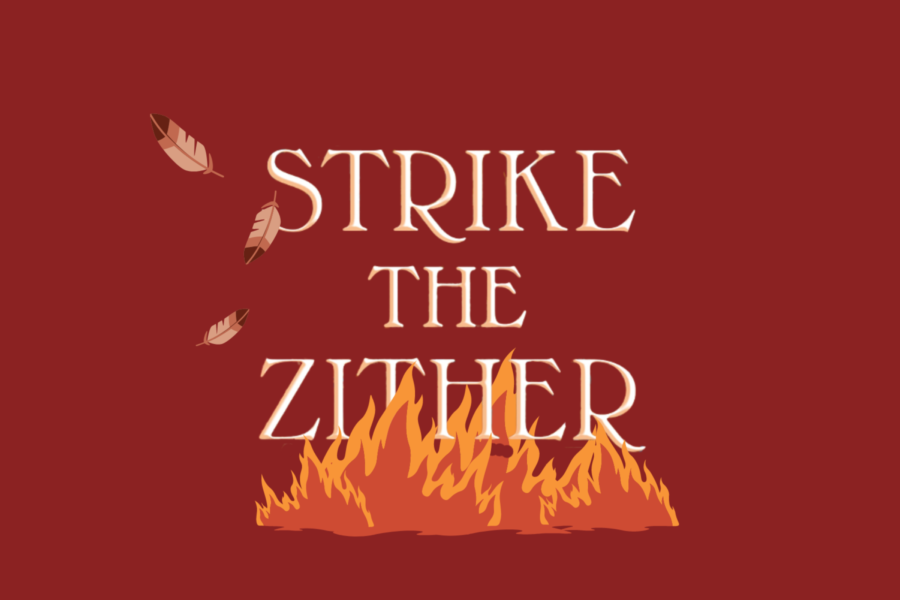‘Strike the Zither’: A delightfully clever novel with rich Chinese inspiration
“Strike the Zither” is the first novel in the “Kingdom of Three” duology. The author, Joan He, describes it as the most culturally-rich novel she’s written thus far, as it draws inspiration from the acclaimed Chinese classic “Romance of the Three Kingdoms.”
November 30, 2022
I’m Chinese American and I may just have a slight obsession with Chinese television dramas. So it’s safe to say that I’m delighted by the recent influx of Chinese-inspired young adult fantasy novels. “Strike the Zither,” a reimagination of the Chinese classic novel “Romance of the Three Kingdoms,” is among the newest of these releases, and is perfect for fans of kingdom politics, calculating plots, and Chinese historical dramas.
“Romance of the Three Kingdoms,” written by Luo Guanzhong in the 14th century, follows the conflict between factions trying to gain power as the Han Dynasty falls, primarily giving the spotlight to Zhuge Liang, a legendary war strategist in Chinese history. “Strike the Zither” mirrors this plot but with female characters in power instead, with three warlordesses fighting for power as a puppet empress rules—Miasma, who’s fighting to keep her control over the empress; Xin Ren, who fights to free the empress; and Cicada, a young warlordess with hidden plans. He’s own Zhuge Liang, Zephyr, is the strategist for Xin Ren, who is honor-bound but lacking in might. When some of Xin Ren’s most trusted followers are captured, Zephyr infiltrates the enemy camp in order to save her warlordess.
Having not read “Romance of Three Kingdoms,” I went into this book practically blind, and was met with riveting political schemes, ruthless war strategy, and an unapologetically strong main character. The novel begins in media res, throwing the reader straight into the warring conflict between warlordesses Xin Ren and Miasma, and never slows down. There is never a dull moment, never a scene where the action dies down, and yet somehow, it’s never overwhelming or too much to take in. Zephyr’s schemes are not convoluted and overly complicated, but had me entirely invested in their outcomes.
My favorite aspect of the novel has to be the leading characters. He built a wonderfully complex, multilayered protagonist with likable strengths and incredibly human flaws. Zephyr is clever, ambitious, and bold, but she is also selfish, haughty, and overconfident at times. She is drawn to the honor of the warlordess she serves, but at the same time, she doesn’t always have honorable motives. He abandons the righteousness of heroes and opts for a more conflicted character whose selfish ambitions and fierce loyalty somehow line up in the same direction. Standing next to Zephyr is the enemy strategist Crow, who is described as “enigmatic” but is nowhere near the brooding, unemotional guy with dark good looks, shrouded in mystery, that stereotypically shows up in novels. Crow is certainly hard to read—but more than that, he’s witty, teasing, and also dying (the most fatal of flaws, if you ask me).
The two of them combined make for a bantering dynamic that softly borrows from the enemies-to-lovers trope. What they lack in page time, they make up for through comfortable, back-and-forth squabbles. Despite the few scenes they have together, He somehow convinces the reader of Zephyr and Crow’s sincere affections for each other, so naturally that it creeps up on you. The romance takes the background in this novel, being sure to support rather than detract from the plot. It clearly has not finished in development, but promises more in the sequel—more drama, at the very least.
The second half of the book takes a turn for the worst, at least in my opinion, as He brings in fantasy elements for a mid-novel twist. After the brief interlude, the fantasy does not take much of the limelight of the novel, but sets up for interesting questions for the sequel. Personally, I didn’t enjoy the fantasy addition. Not only did it seem to come out of nowhere, but it was especially disorienting when everything leading up to the twist was purely human—human desires, human skill, human weaknesses. The fantasy elements seemed to take away from the enjoyable political and strategic plot. I would’ve preferred the novel sticking with the realistic alternate historical universe established in the first half and kept the focus on the political schemes. However, He does defend this choice as a nod toward the events in “Romance of the Three Kingdoms,” and having not read the novel, I can’t fully appreciate the twist.
“Strike the Zither” is a clever novel powered by female characters that reminds us that stories can be both plot and character driven—and are even better for it. Set against a rich and politically complicated backdrop modeled after the Three Kingdoms period of imperial China, He shows us what happens when power, loyalty, and human relationships conflict—and raises the question of which one will win out in the end. I will definitely be getting my hands on the sequel when it comes out next year.






